| |
"She can be very tetchy in the morning, and I do know that she ran the wardrobe ladies [on The Lonely Passion of Judith Hearne] a merry dance. She is persnickety (sic). But she is always right in the demands she makes. She is unbelievably professional, and unbelievably instinctive. She is top of my list." |
| |
Director Jack Clayton on his leading lady, Maggie Smith* |
The Lonely Passion of Judith Hearne is challenging cinema but not in the way that this term may usually be interpreted. It has no excessive violence or nudity (there is one violent scene but we'll come to that later) and it has a linear narrative with a few easy to follow flashbacks. There are no ideas too arcane to grasp and each actor gives a genuine and convincing performance making it easy to understand their desires and frustrations. So why is it challenging? It's challenging in the sense that every one in it practically demands that you despise them. That we are sympathetic to the lead character is only because we get to spend more time with her. We glimpse under the battered carapace of her emotional defences. But even she is hard work. At the end of the film, you've been on a journey, no doubt, with master classes in the acting craft laid out for your pleasure but the overall is so bleak, so sorrowful, that you get sucked in, your shoulders heavy with a dark, wet cloak of sadness and longing. The 'Passion' of the title probably refers more to its biblical meaning of 'suffering' rather than relating to a heated romance. Take your pick. You simply cannot imagine this world of Dublin in the 1950s and how starkly different it is from the world we inhabit today. For that aspect, it's well worth a look and maybe a few whispered 'Phew's with gratitude that you never had to navigate that stultifyingly religious and harshly cold environment. We complain about life in the world right now (the orange comb-over, the prospect of Boris Johnson as Prime Minister and a no deal Brexit, climate change and the surge of right wing ideology all over the world) but with even the most pessimistic view of human life, socially, things have significantly improved in seventy years. Judith Hearne proves this if we are to accept the authenticity of the drama from printed page to screen.
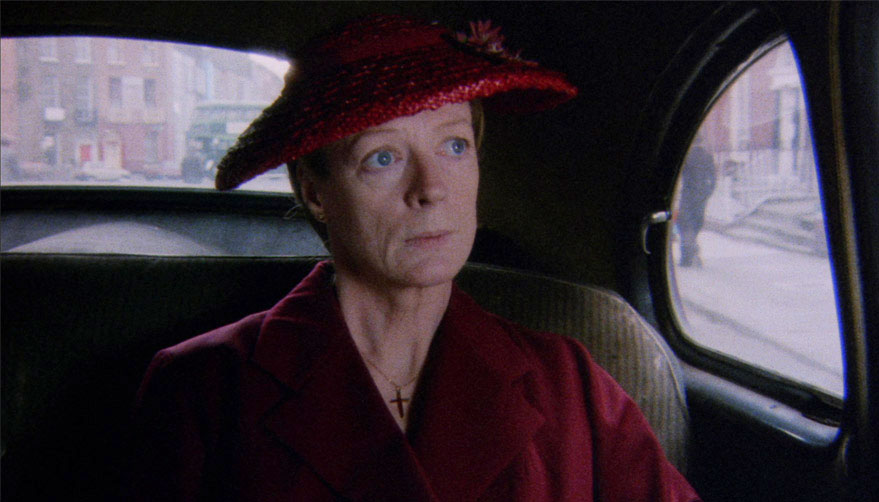
But the character of Judith Hearne (Hearne, a mash up of 'hurt' and 'yearn' perhaps?) is stuck in her own era and a victim of strict religious conformity and the march of time, both of which have thrust her into late middle age without love or close companionship. At first, we meet Judith as a young girl with potential and an exciting life ahead of her, joining her aunt on a pew in a church. We don't know this yet, but it's her aunt who is her legal guardian, an aunt whose spine would snap if it were held any straighter. Her elderly and stern, judgemental face tells us all we need to know about Judith's childhood, poor thing. Just that derisive and withering look has, day after day, scraped off all the self-esteem that the young Judith may have stored up in childhood. She gets a bout of hiccups and can't control herself. The other children laugh… Why? Because hiccups are funny and in church they are doubly so. In the House of God, you cannot possibly be frivolous. Judith's aunt, so straitjacketed by other people's expectations of her own behaviour, takes her niece's hand in hers and crushes it so hard that tears start to fall down little Judith's face. Welcome to the world of adults under the thrall and intoxication of one of the worst ideas a sentient primate ever had. Praise be.
I made a big fuss about our animal natures being restricted by religion in the first paragraph of my review of Black Narcissus so I won't repeat myself. But I will repeat the essence of it. We are animals (yes, we are) and if we adhere to a religious doctrine – one that requires that we stay in denial of our own nature – then let's say there won't be cakes for tea. Judith Hearne finds this out way too late. At a boarding house run by a viper of a woman who barely utters a civil word without pools of venom flowing around their rancid roots, Judith moves in. A music teacher with very few pupils, Judith is obviously wracked with guilt inspired by the Catholic Church but longing for love. As she unpacks, a framed portrait of her aunt goes on the mantle first. I wasn't sure if it were possible that this face could be any more disapproving. The Sacred Heart (a famous picture of the son of God, the big JC) will go up next to it but there's that other possession, the one in a brown paper bag, the unholy spirit. That one is furtively hidden in the wardrobe. Yeah, like that's going to make Judith stop dreaming of its power, its ability to lift the leaden deadweight of expectation and gloom inherent in Judith's very bones. Here is a woman that alcohol was designed for, a literal solution to her predicament. Sloshed and happy, Judith says "Just one more…" and then pours a double and then another double on top of that. I suspect those of us who enjoy altering our brain chemistry with the demon drink know that pernicious thought all too well. "Just one more…"
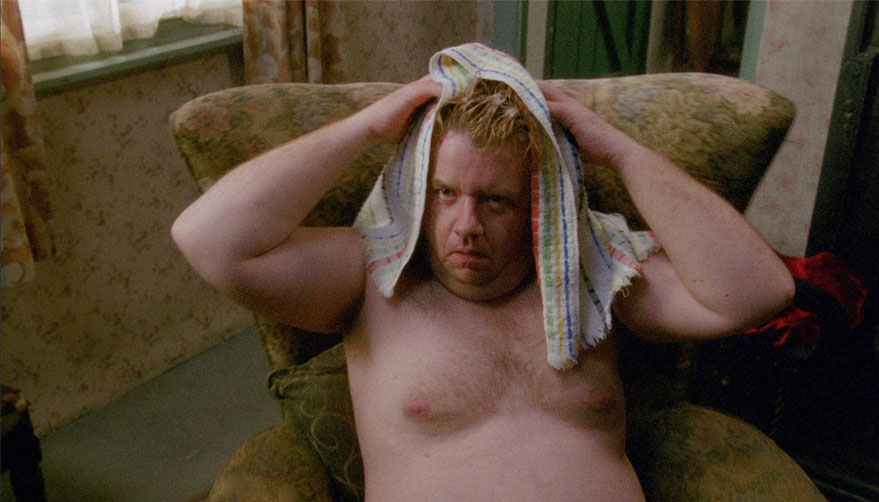
Enter Madden, the landlady's brother who has spent three decades in the States so that his presumably original Irish accent has been submerged by an American one. Judith's interest is piqued. Madden's is activated solely by the thought of money and how Judith might take a financial risk with him. The landlady's son, first encountered almost naked, is an obese mother's boy who's taking nightly advantage of the home help, something that frustrates Madden (partly because he's jealous). Against this dour backdrop is a wrong-footed, misinterpreted and cautious romance. Judith's struggle to appease God and satisfy her own desires – both of course are woefully incompatible – is destined for failure. So that knock on the door is not Mr. Happiness and Mrs. Fulfilment. Despite the despondency, there are several aspects that make the film intriguing. There are the deft and earnest performances and the almost invisible direction of Jack Clayton. Clayton moves the camera almost surreptitiously and always in service to the narrative. Unless you say to yourself "I'm going to study the camera movement," it becomes invisible in a heartbeat. That's great direction. At 58' and 36" there's a shot of Judith talking to the picture of her aunt giving us a drunken rendition of the song When You're Smiling. You may not be aware of it but Clayton gives us a 360-degree plus camera movement keeping Judith locked in a mid shot cradling her whiskey bottle. This is invisible craft and a fantastic example of it. Clayton had a reputation as a particularly sensitive director of women (Simone Signoret, Deborah Kerr and Anne Bancroft all excelling in Room at the Top, The Innocents and The Pumpkin Eater respectively). And there is no doubt he is in perfect simpatico with his leading lady, the rather brilliant Maggie Smith who had half a day's work on The Pumpkin Eater which is how she first came to Clayton's attention.
Like 'random' and 'enormity', 'pathetic' is a much-misused word. It's become a synonym for poor quality or weakness. Its original meaning was to describe something or someone worthy of pity. Judith is the personification of pathetic right up until she takes her life by the scruff of its neck. Her status with whom we initially regard as her friend is really a sad, lonely figure to be mocked behind her back. Her friend's family are all in on the joke and are scornful of her rigid but mousy personality. "It's only me!" they ape as they scuttle off not even wanting to engage with her on any level. Judith knocks on the door… "It's only me!" she says as she cautiously enters the living room. Maggie Smith is an actress of considerable power and to bottle that up and become a meek soul, a woman suffused with God-generated guilt, haunted by both the false promise of what might be and the spectre of her brutal aunt, seems like it must be too much of a stretch – like hiring Danny De Vito to play Thor. But I'd forgotten her chameleonic qualities. When she hurts, we hurt. Her triumphs (even if her short term joy is derived from alcohol abuse) are our triumphs. When she succumbs to the brown paper bag in her wardrobe, her subsequent fall from grace is a public one and the next day a living hell.
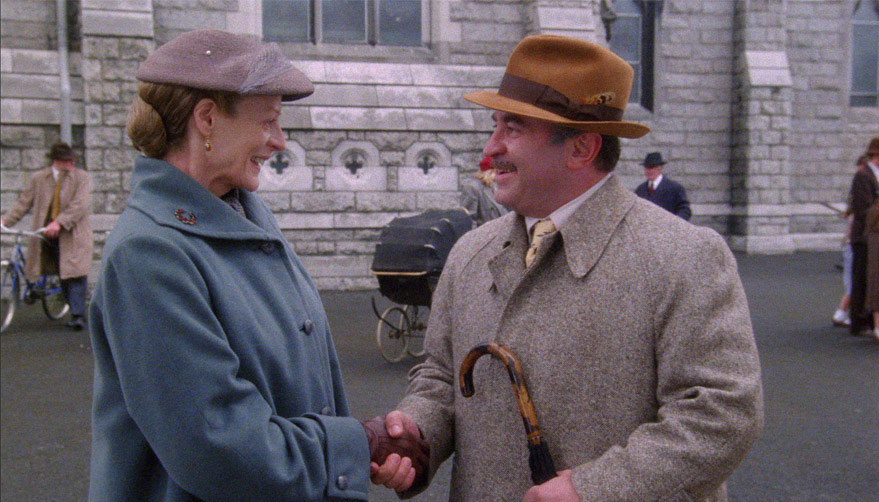
In mid-career, Bob Hoskins as Madden is his familiar physical ball of energy with the New World drawl and the barely disguised disgust at his own nephew. Hoskins at this stage in his career had a patent pending on inexpertly controlled rage. Initially that rage expresses itself via a few slaps on a girl's backside but things soon get a lot darker. Maintaining the illusion that he is something he certainly is not and never was is part of his allure, a lure for a well-heeled female partner. His ambitions are slight, his self-esteem pint-sized and his boiling point, low. Aggrieved that his heavyweight nephew Bernard has a sexual partner, someone to play with (few people have fun in this movie), Madden gets up from his bed with a small 'girlie' magazine not enough to satisfy him and goes out on to the landing. We cut to Judith, now downing the quadruple whiskey and we gird ourselves up for an ugly confrontation. Silence of the Lambs style, we get a nice switcheroo. As Madden opens a bedroom door, we realise it's Mary the maid's room. She sits up in bed. Wonderfully played by Rudi Davies, Mary smiles in expectation of Bernard and out of the shadows looms Madden. The fear in her features is hard to face as Hoskins holds her down and rapes her. This is a difficult scene. No shit, Sherlock. On backing out of her room, Madden whispers to the whimpering girl, "It's our secret, just between us…" My sympathy for this dejected, downtrodden rapist disappeared a second after his first move on her. The event is referenced only once more (in Madden's mind) and he simply carries on as normal. Surely this was not 'that normal' in the fifties? Perhaps it was. There are all sorts of ugly creatures who used to scuttle in the dark who are now exposed to the light and retroactive justice of the 21st century. When Madden does something sweet for Judith while she's comatose from drinking, emotionally aided by composer George de le Rue's orchestral score, it's a minute after he's told that his rape victim was 16, right on the age of consent in the 50s. We've come a long way. In the 13th century, the age of consent was (I am not making this up) 12 years old. I could not bring myself to offer Madden any slack despite his apparent sweetness in this scene. He is the author of his own pathetic nature but I just couldn't push past the narrative's casual brushing off of this awful attack.
The supporting cast are all first class. As I mentioned, Rudi Davies makes us feel the frustrations and short-term joys of being the lowliest lackey in the household. She also is distressingly convincing after her assault. Ian McNeice is quite brilliant as Bernard. Willing to expose oneself for art is always commendable but he's not blessed with the kind of shape, I suspect, most would find appealing. McNeice has always struggled with weight but here he has found a character that fits him snugly. Bernard is weak, a sponger and content to live his life the easiest way possible. He is deliberately repulsive but that indeed is the point. Then there is Prunella Scales. Forever Sybil Fawlty to a certain generation and Benedict Cumberbatch's mother in the priceless radio sit-com Cabin Pressure to a later generation, she plays one of Judith's only friends, Moira. It's her family mentioned earlier that don't understand why she could possibly tolerate Judith and there's a remark from Judith to Moira late in the film as heartbreaking as it's probably true. I must of course mention Wendy Hiller, an actress who has starred and featured in some terrific films (I Know Where I'm Going and The Elephant Man are at the head of that queue). Her haughty demeanour and attitude of superiority and conformity seem almost hard-wired. Irish theatrical legend Marie Kean has a riot playing the landlady with a psychotic misanthropy that renders an offer of a cup of tea as a searing sneer of disdain and disapproval. She's only ever honest when her view of squalid humanity is justified by the behaviour of those around her. There's one last well-known face to note. An hour and twenty minutes in, Judith buys some whiskey from a young curly headed boy in a very short scene. I have to admit, I had to watch this scene a few times to recognise the most devious and calculating man in Westeros… Aiden ('Littlefinger') Gillen in his big screen debut, bless.
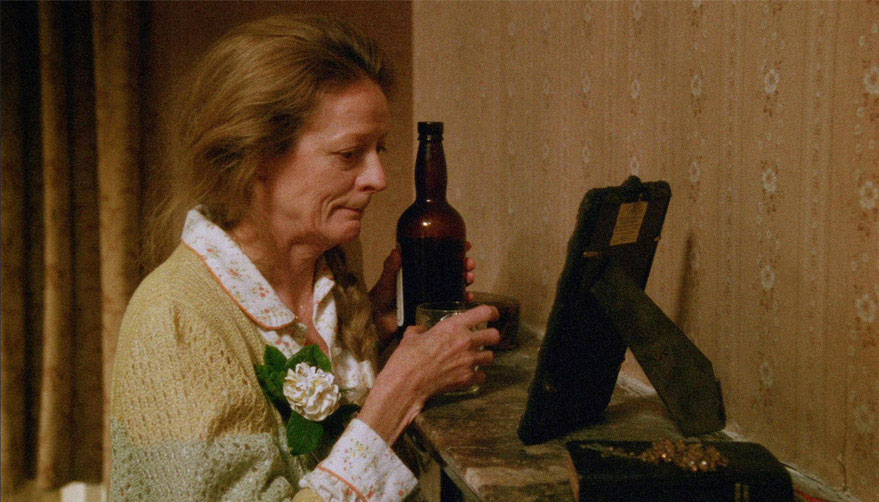
Yes, Handmade Films had misfires but in its short twelve year life before it was gobbled up by Paragon Entertainment, it gave the world Monty Python's Life of Brian, The Time Bandits, The Long Good Friday, Withnail and I and Mona Lisa. Not at all bad for an ex-Beatle who simply wanted to see the Python film that kick started the company. In fact, if you look at Handmade's complete output, you wonder what sensibility behind the no brainer of financing Life of Brian would put any financial clout behind some of the less well-received projects. The Lonely Passion of Judith Hearne is a hard sell. I'm assuming the success of the novel Judith Hearne (written by a 27 year old Brian Moore, 27!) was the driving force behind the decision to make the film. I very much appreciate the artistry, sacrifice and dedication that goes into bringing a story like this to life and the film has many merits worth celebrating notably its performances and the nuances of its direction. But after a viewing, get some ice cream and a few Flakes or line up Singin' in the Rain next for the Blu-ray. You're going to need some serious happy time after walking the lonely streets in the lonely world of the lonely Judith Hearne.
The 1.75:1 aspect ratio presentation looks solid with old school production lighting and craft that still shines. Contrast is good while grain comes through in darker scenes and in one in particular which looks like another generation away from the original negative when Judith and Madden return to the boarding house at night. Colours are faithfully rendered with warm skin tones.
The original mono soundtrack is perfectly sound (forgive the unintentional pun) with no words lost to older recording techniques or mumbles.
There are new and improved English subtitles for the deaf and hard-of-hearing.
Postscript:
One of the best film editors of his generation, Terry Rawlings, died this year. He was most famous for his work on Blade Runner, Chariots of Fire and Alien, any one of which would light up anyone's CV. Terry cut Judith Hearne and knowing how good he is (his long dissolves are not to my taste but that's a personal issue) I had to wonder over a very early cut in the church where we are focussing on Judith and her aunt. We jump cut to a same focal length shot with the two off to the right a little and the priest magically appearing on the left of frame.

Some have suggested that the reason for this cut is that over title sequences you have more latitude for this kind of time saving jump cut. Others suggested that there must be a fault on the disc or the hardware I'm playing it on but I have a previous copy of Judith Hearne from another country and the same cut exists there too. It's during the opening credits and because there is no jarring sound problem over the edit, I must assume it was deliberate and there is no missing shot between the two shots. I'd love to know what was behind the decision to let it stand. Alas.
Judith Hearne Remembered (2019): documentary featuring interviews with actors Maggie Smith, Ian McNeice and Rudi Davies (3' 00")
This is a wonderful goldmine. Three actors with their memories of production, each with their own singular point of view. There's the star, a supporting actor and a young actress with a small but significant part. I'm not going to report on the details of what's said, suffice to say that the recollections are honest, entertaining and some of the stories just so insightful on the movie making process. It's also gratifying to confirm from McNeice's own words that Pauline Kael's review was instrumental to the American stage of his own career. Her piece (in the accompanying booklet by the way) was reported back to McNeice by a friend (also one of my own), writer/director Chris Monger with whom McNeice shared an education. It's just nice to have these stories confirmed by those involved. Maggie Smith's Wendy Hiller shakey hands story is a doozy. Not quite sure exactly what a doozy** is but let's let that one lie for now.
Selected scenes commentary with Neil Sinyard, author of British Film Makers: Jack Clayton (33' approx.)
Indicator regular Neil Sinyard takes us through selected scenes and as ever his insights are surprising and very welcome. He often quotes from the original book in setting up a few supporting characters. He also quotes John Huston telling director Jack Clayton, "Directing, kid. That's where the fun is!" He got that right. He also pronounces the author's Christian name as 'Bree-an as opposed to how must of us would pronounce 'Brian'. The man knows his Irish pronunciation. We learn that both stars took a drop in salary to get the film made. I was very curious about why one of Britain's best directors only made seven features in his career. He had a lot of bad luck setting up other projects but at the end of the 70s he suffered a stroke but made a recovery to make three more movies. "It's only me," Judith's signature introduction is a phrase Sinyard never used again after seeing this film. You can't blame him. We learn about Clayton's wartime past. He was one of the poor buggers sitting in a glass bubble at the front of a Lancaster. That would give anyone PTSD for life. Judging by editor Jim Clark's memoir Dream Repairman (Clark cut two Clayton films, The Innocents and The Pumpkin Eater) Clayton could be wildly unpredictable, a drinker and explode easily but the reputation he has based on his work is one of sensitive artist! Print the legend! This is a great extra with the ever-dependable Neil Sinyard.
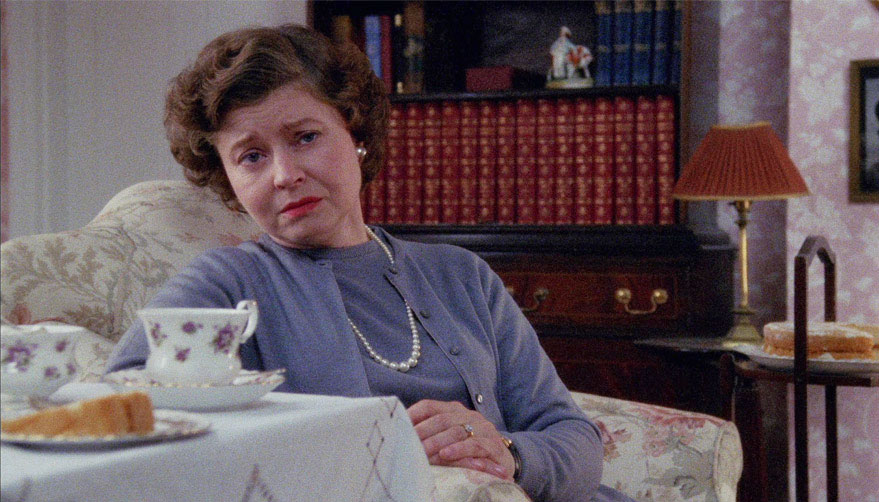
Original trailer (3' 00")
With no voice over relying completely on craftily edited dialogue from the excerpted scenes, this is a trailer that tells the story in a truncated form. There are spoilers as such if you'd seen the film and then of course recognise them as such but all told, it's an effective sell for a very unusual and intense movie. After seeing the trailer, you wouldn't expect the movie to be a barrel of laughs.
Image Gallery
This is not quite the abundance featured in previous Blu-ray releases but interesting nonetheless. We have 13 colour publicity photos and a single behind the scenes black and white shot followed by a mere two poster designs.
Limited edition exclusive 32-page booklet featuring Pauline Kael's appraisal of the film, Bethan Roberts on Brian Moore, Jack Clayton, Maggie Smith and Bob Hoskins on The Lonely Passion of Judith Hearne, an overview of contemporary critical responses, and film credits.
Pauline Kael’s Hooked is a collection of 80s movie reviews in which her Judith Hearne review appears and is well worth a read for a snapshot of 80s mainstream cinema. Or you can read that particular review here, reprinted for your pleasure. Kael's style always forces you to see a film through her eyes, which is interesting given the fact that most credible film reviewers try to remove their own prejudices and character from any formal review. We don't do that here, do we? Not so much. Bethan Roberts on author Brian (Bree-an remember) Moore (1921-1999) is informative and proves the author to be a man who put the 'art' into 'cathartic'. What a great way to exorcise your demons by writing them down and then renouncing them. There’s an odd discrepancy in timing. Maggie Smith says Moore wrote the novel at the age of 27. He is quoted saying that he was 28 when he started thinking about writing Judith Hearne and it wasn’t published until 1955 when he was the grand old age of 34. Making Judith Hearne is selected interview bites from Jack Clayton and Bob Hoskins and we are let into why there is the appearance of a very famous pop star’s name in the credits as an associate producer, Reginald Dwight. Look him up. Critical Response – the 1987 reviews are mostly positive, praising the acting and direction which is no surprise. A terrific booklet.
The Lonely Passion of Judith Hearne is a hard hitting and emotional drama about a woman who suddenly realises that life has passed her by. Brilliantly acted by both stars and the supporting cast, it charts a desperate woman's psychological demise as she looks for love in all the wrong places. And for an encore, she gives Jesus and company a slap in the face. It is by no means easy going and the throwaway rape scene turns my stomach (if it's in the book, then yeah, fine) but if you like your drama dark and challenging, then pay Judith Hearne a visit.
|